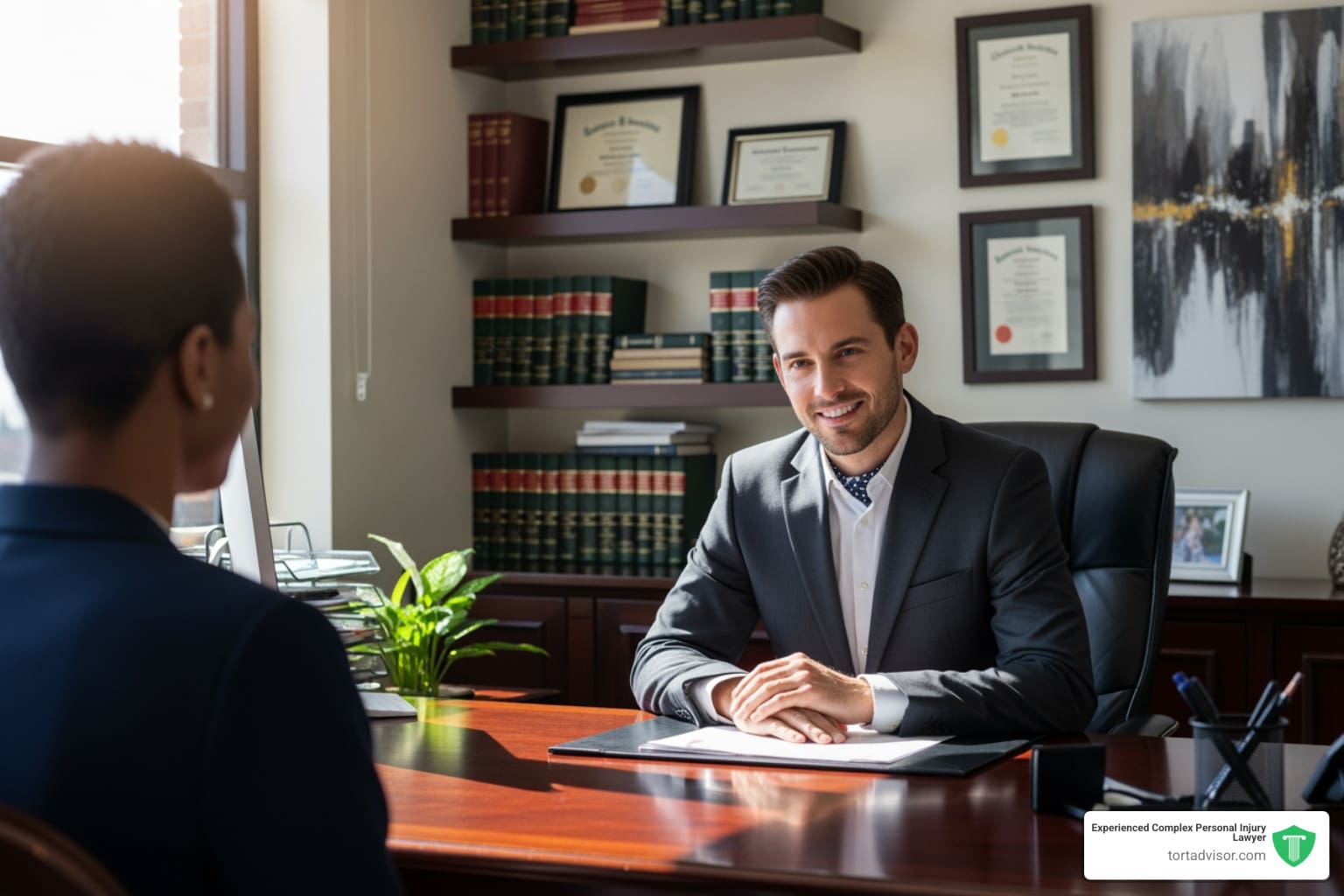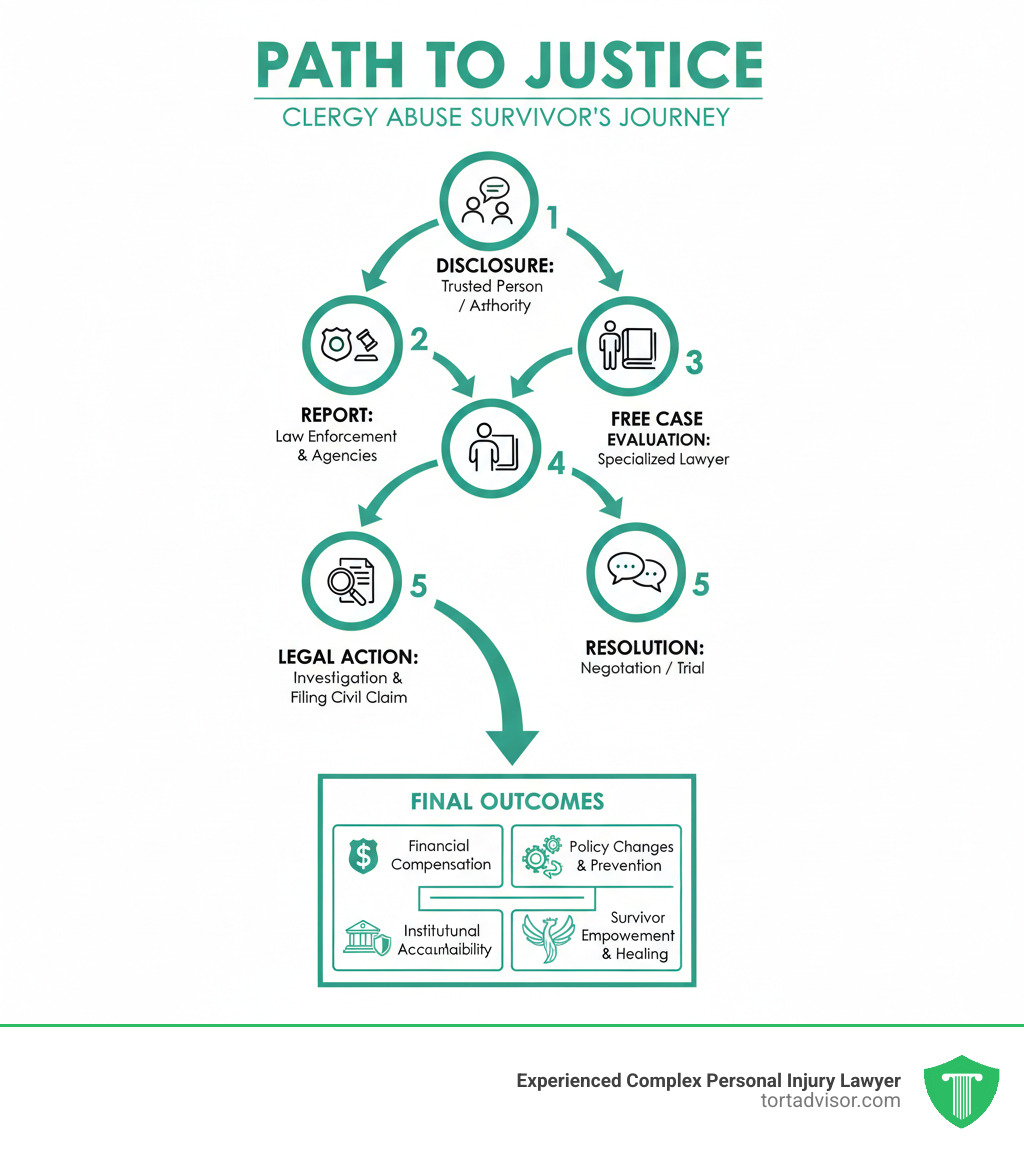


Why Finding the Right Priest Abuse Lawyer Matters When You’ve Been Betrayed
A Priest abuse lawyer is a specialized attorney representing survivors of abuse by clergy members. They help you seek justice and compensation through civil lawsuits against both individual abusers and the religious institutions that failed to protect you.
Sexual abuse by clergy is a profound betrayal of trust, causing psychological and emotional damage that can last a lifetime. This crisis is not confined to one denomination; the Catholic Church, Southern Baptist Convention, United Methodist Church, and others have all faced widespread allegations of abuse and institutional cover-ups.
For decades, many survivors remained silent, but legal landscapes have shifted dramatically. Many states have revised their laws, allowing adult survivors to file civil claims years after the abuse occurred. These lawsuits provide more than just compensation; they force institutions to acknowledge their failures, implement child protection policies, and prevent future abuse.
Navigating this path requires a specialized lawyer who understands the unique challenges of these cases. This guide will explain everything you need to know, from who can be held liable to finding the right legal advocate.
What to Look for in a Priest Abuse Lawyer:
- Proven Experience: A track record with clergy abuse cases and major settlements.
- Trauma-Informed Approach: Compassionate handling of sensitive cases.
- Contingency Fee Structure: No upfront costs; you only pay if you win.
- Investigative Resources: Access to experts and evidence-gathering tools.
- Strong Negotiation Skills: Ability to stand up to powerful religious institutions.
- Clear Communication: Keeps you informed and respects your privacy.
I’m Mason Arnao. My work in data systems management has shown me how critical discretion, security, and thorough documentation are—principles that are essential for priest abuse lawyers building strong cases for survivors.
Understanding Clergy Abuse: The Scope and Devastating Impact
Clergy abuse occurs when a religious leader—a priest, pastor, rabbi, or anyone in a position of spiritual authority—misuses their power to harm someone. This betrayal often reveals systemic problems within religious institutions that allow abuse to happen and then work to conceal it.
Defining Clergy Abuse and Its Various Forms
Clergy abuse takes many forms, all exploiting a sacred trust and power imbalance:
- Sexual abuse: Any unwanted sexual contact, from inappropriate touching and grooming to forced sexual acts and rape.
- Spiritual abuse: Weaponizing faith to manipulate or justify actions, shattering a survivor’s relationship with their beliefs.
- Emotional abuse: Using authority to control, demean, or isolate a person, creating an atmosphere of fear and guilt.
- Physical abuse and Neglect: Intentional bodily harm or the failure of an institution to protect someone in their care from harm.
Recognizing the Warning Signs in Victims
Victims often suffer in silence due to shame and fear. Recognizing warning signs is a critical first step toward getting help. Look for:
- Sudden behavioral changes: A happy child becoming withdrawn, aggressive, or fearful.
- Regression: A return to younger behaviors like bedwetting.
- Unexplained fears: Particularly around church, certain people, or being touched.
- Inappropriate sexual knowledge for their age.
- Emotional withdrawal, persistent sadness, or isolation.
- Self-harm, substance abuse, or a decline in school or work performance.
The Lasting Effects of Clergy Abuse on Survivors
The wounds from clergy abuse are deep and long-lasting. Survivors often struggle with:
- Severe psychological trauma: Including chronic depression, anxiety, and Post-Traumatic Stress Disorder (PTSD).
- Inability to trust: Making it difficult to form healthy relationships.
- Crushing guilt and shame, even though they are not at fault.
- Spiritual crisis: Losing faith when it becomes associated with trauma.
- Relationship and intimacy difficulties.
These profound wounds are why survivors need comprehensive support, including legal pathways to justice like a Child Sexual Abuse Lawsuit.
A Crisis Beyond One Denomination
While the Catholic Church has faced massive scrutiny, with estimates that 4% of priests have been accused of abuse, this crisis spans all faiths. The Southern Baptist Convention, United Methodist Church, Jehovah’s Witnesses, and the Mormon Church have all faced extensive allegations of abuse and institutional cover-ups. Any institution with a power imbalance can become a breeding ground for abuse, making it essential to work with a priest abuse lawyer who understands these dynamics across denominations.
The Legal Path to Justice: Holding Abusers and Institutions Accountable
Pursuing justice through a civil lawsuit is about reclaiming your power, getting the resources you need to heal, and forcing institutions to change. A skilled priest abuse lawyer can guide you through this process, and you can learn more about your general options in a Sexual Abuse Lawsuit.
Who Can Be Held Liable in a Clergy Abuse Case?
Can I sue the institution as well as the abuser? Yes, and it is often the most effective path to justice. While the individual abuser is directly responsible, they often lack the assets to provide meaningful compensation. Therefore, lawsuits frequently target the religious institution for its failures, based on legal theories like:
- Negligent Supervision: The institution knew or should have known about the abuser’s behavior but failed to act.
- Negligent Hiring: The institution failed to conduct proper background checks or ignored red flags.
- Vicarious Liability: The institution is responsible for the actions of its employees.
- Cover-ups: The institution actively concealed abuse, such as by transferring abusers to new parishes.
Lawsuits against institutions have the power to force systemic change and provide the resources for survivor compensation.
Navigating the Statute of Limitations
Statutes of limitations—legal deadlines for filing a lawsuit—have historically been a major barrier for survivors, who often need decades to process their trauma. However, the legal landscape is changing.
Many states now use a “findy rule,” where the clock starts not when the abuse occurred, but when the survivor finds the connection between their psychological harm and the past abuse. More importantly, many states have passed “lookback windows” or Child Victims Acts. These laws temporarily or permanently lift the statute of limitations, allowing adult survivors to file claims regardless of when the abuse happened. As of recently, 15 states have revised their laws to make it easier for survivors to sue. Never assume it’s too late; consult a lawyer who is current on these evolving laws.
Civil vs. Criminal Cases: Understanding the Difference
Criminal and civil cases are separate legal paths with different goals and standards. You can still pursue a civil claim even if your abuser was never criminally charged.
| Feature | Criminal Case | Civil Case |
|---|---|---|
| Purpose | To punish the offender for a crime against society. | To compensate the survivor for harm and losses. |
| Who Files | The government (prosecutor). | The survivor (plaintiff). |
| Burden of Proof | “Beyond a reasonable doubt” (very high). | “Preponderance of the evidence” (more likely than not). |
| Outcome | Prison time, fines, criminal record. | Financial compensation (damages). |
The lower burden of proof in civil cases makes them a more accessible path to justice for many survivors.
What Compensation Can Survivors Seek?
While no amount of money can erase the trauma, compensation acknowledges your suffering and provides resources for recovery. You can seek:
- Special Damages: Tangible costs like medical bills, therapy expenses, and lost wages.
- General Damages: Compensation for intangible harm like pain and suffering, emotional distress, and loss of enjoyment of life.
- Punitive Damages: Awarded in egregious cases to punish the institution and deter future misconduct.
Settlements can be substantial. The Archdiocese of Los Angeles paid $660 million, and the Diocese of Camden paid $87.5 million to survivors. An experienced priest abuse lawyer will fight to ensure you receive compensation that reflects the full extent of your harm. Our Sexual Abuse Settlement Calculator can provide a general estimate.
The Crucial Role of an Experienced Priest Abuse Lawyer
Facing powerful religious institutions requires more than just any attorney; it demands a specialized priest abuse lawyer who acts as both a legal expert and a compassionate advocate. An Abuse Victim Lawyer provides the dedicated support needed throughout this challenging process.
How a Specialized Priest Abuse Lawyer Fights for You
A dedicated lawyer manages the entire legal battle while you focus on healing. Their work includes:
- Thorough Investigation: Deeply examining the abuse, the abuser’s history, and institutional failures.
- Evidence Gathering: Collecting medical and therapy records, journals, and crucial institutional documents that may reveal a cover-up.
- Witness Interviews: Speaking with other survivors or former staff to establish patterns of abuse and negligence.
- Expert Consultation: Working with former law enforcement, medical experts, and psychologists to build a powerful case.
- Navigating Complex Laws: Applying the correct legal theories and challenging statutes of limitations.
- Negotiation and Litigation: Aggressively negotiating for a fair settlement or representing you with strength and compassion in court.
Key Qualities to Look for in a Priest Abuse Lawyer
Choosing the right lawyer is critical. Look for these essential qualities:
- Proven Track Record: Specific experience and successful settlements in clergy abuse cases.
- Trauma-Informed Approach: Understands the psychological impact of abuse and prioritizes your well-being.
- Contingency-Fee Structure: You pay no upfront fees, and the lawyer is only paid if they win your case.
- Investigative Resources: Access to experts and the financial ability to fund a complex investigation.
- Clear Communication: Keeps you informed and explains the process in understandable terms.
- Compassion and Respect: Believes you, validates your experience, and treats you with dignity.
Overcoming Challenges with the Right Legal Partner
An experienced lawyer is prepared to overcome the significant obstacles in these cases:
- Institutional Cover-ups: Using legal findy to unearth hidden documents and expose secret lists of abusers, like the one found in the Southern Baptist Convention.
- Fear and Shame: Creating a safe, confidential space for you to share your story and handling all confrontations on your behalf.
- Intimidation Tactics: Acting as a buffer against the aggressive legal strategies of powerful institutions.
- Protecting Your Privacy: Working to keep your identity confidential throughout the legal process.
- Forcing Institutional Change: Using your lawsuit to compel organizations to implement better safety policies, preventing future abuse.
Taking the First Steps Toward Healing and Justice
Coming forward after clergy abuse takes immense courage. Know that you are not alone, and there is a path forward. Taking the first steps can feel overwhelming, but the right support can guide you toward healing and justice. For more information, visit our page on Church Religious Organization Sexual Abuse.
Immediate Actions for Survivors and Their Families
Your immediate priority is safety and well-being. These practical steps can also protect your legal rights:
- Ensure Safety: First, get the victim to a safe place, away from the abuser.
- Report to Authorities: Contact local law enforcement or child protective services. This creates an official record. You can find resources for reporting abuse to authorities through government channels.
- Seek Care: Get medical attention for any physical injuries and find a therapist specializing in trauma to begin the healing process. This also creates important documentation.
- Document Everything: Write down all details you can remember—dates, locations, conversations. Preserve any physical evidence like letters, emails, or gifts.
- Consult a Lawyer: The most important step is to contact an experienced priest abuse lawyer. The first step to filing a claim is a free, confidential consultation to understand your rights and options.
Finding Support and Resources for Recovery
Legal action is one part of the journey; emotional recovery is another. Seek out resources to support your healing:
- Trauma-Informed Therapy: Find a therapist who understands the unique betrayal of religious trauma.
- Survivor Support Groups: Connecting with others who understand can be life-changing. Organizations like SNAP (Survivors Network of those Abused by Priests) offer community and advocacy.
- Mental Health Hotlines: These provide immediate support when you need someone to talk to.
The Institutional Response: Cover-Ups vs. Mandatory Reporting
For decades, the institutional response to abuse was concealment. Abusers were quietly transferred, records were hidden, and victims were silenced. The Guidepost report on the Southern Baptist Convention revealed how leaders prioritized avoiding liability over protecting survivors.
However, the law is changing. More states now designate clergy as “mandatory reporters,” legally requiring them to report suspected child abuse to civil authorities. Failure to do so can lead to criminal charges and increases the institution’s civil liability. This legal shift is forcing accountability and helping to break the cycle of abuse and cover-ups.
Frequently Asked Questions about Priest Abuse Lawsuits
It’s natural to have questions before taking legal action. Here are answers to some of the most common concerns survivors have.
Can I file a lawsuit if the abuse happened decades ago?
Yes, in many cases, you can. For years, strict time limits called statutes of limitations prevented older claims. However, the law is changing. Many states have created “lookback windows” or passed Child Victims Acts that temporarily or permanently remove these time limits for survivors of childhood sexual abuse. Additionally, the “findy rule” in some states means the deadline doesn’t start until you connect your psychological harm to the past abuse.
Laws vary significantly by state. Recently, 15 states have made it easier to sue. Whether you are in Alabama, California, New York, Florida, Texas, Illinois, or any other state, it is crucial to consult a specialized priest abuse lawyer. They can review the specific laws in your location—from major cities like Chicago and Miami to smaller communities—and determine if you have a case. Don’t assume it’s too late.
What kind of evidence is needed for a civil case?
Abuse almost always happens in private, so survivors worry about a lack of proof. However, in a civil case, you only need to show it’s “more likely than not” that the abuse occurred. You don’t need the ironclad proof required in criminal court. For more details, read about what evidence you need to prove your case.
Key evidence includes:
- Your Testimony: Your detailed account is the most powerful piece of evidence.
- Witness Statements: Testimony from anyone who noticed behavioral changes, saw suspicious interactions, or to whom you disclosed the abuse.
- Documentation: Personal journals, diaries, and medical or therapy records that show the impact of the abuse.
- Institutional Records: Internal church files, emails, or transfer records that your lawyer can obtain through legal findy to prove negligence or a cover-up.
- Expert Testimony: Psychologists can explain the dynamics of abuse and its long-term effects.
What if the abuser is deceased or has no money?
This does not prevent you from seeking justice. Most clergy abuse lawsuits target the institution that employed and enabled the abuser, not just the individual. You can still file a lawsuit against the church, diocese, or religious order.
These institutions can be held liable for negligent hiring, negligent supervision, or actively covering up the abuse. Crucially, religious organizations and their affiliates carry substantial insurance policies designed to cover these claims. The compensation paid to survivors typically comes from these insurers, not the abuser’s personal assets. If you’re wondering what happens if the abuser has no money, know that an experienced priest abuse lawyer focuses on holding the responsible institution and its insurers financially accountable.
Conclusion: Your Path to Accountability Starts Here
Taking the step to explore your legal options is an act of incredible courage. The path to justice after clergy abuse is challenging, but healing is your right, justice is possible, and you do not have to do this alone.
For too long, institutions chose to protect their reputations over protecting you. Now, the legal landscape has shifted in favor of survivors. Your voice has power, and a lawsuit can bring not only personal validation and compensation but also force the institutional changes needed to protect others.
Choosing the right legal advocate is everything. You need a compassionate, experienced priest abuse lawyer who understands the pain of spiritual betrayal and knows how to fight powerful organizations. They will be your partner, fighting for the compensation you deserve while protecting your privacy and well-being.
This is where Tort Advisor can help. We connect survivors with elite attorneys who have a proven track record of securing multi-million dollar settlements in clergy abuse cases. We have specialists ready to help across the country, whether you’re in Alabama, Alaska, Arizona, Arkansas, California, Colorado, Connecticut, Delaware, Florida, Georgia, Hawaii, Idaho, Illinois, Indiana, Iowa, Kansas, Kentucky, Louisiana, Maine, Maryland, Massachusetts, Michigan, Minnesota, Mississippi, Missouri, Montana, Nebraska, Nevada, New Hampshire, New Jersey, New Mexico, New York, North Carolina, North Dakota, Ohio, Oklahoma, Oregon, Pennsylvania, Rhode Island, South Carolina, South Dakota, Tennessee, Texas, Utah, Vermont, Virginia, Washington, West Virginia, Wisconsin, or Wyoming.
Don’t let another day pass in silence. It doesn’t matter if the abuse happened decades ago. Changes in the law have opened new doors. Your path to accountability and healing starts now.
Find specialized legal help for church and religious organization sexual abuse
Free Confidential Case Evaluation
Complete the short form below to get an immediate FREE case review with an expert in your specific claim. Don't wait, your case could be time sensitive to file a claim.
Related Posts
Did a North Dakota product cause harm? Understand product liability, your rights, and how to take action for defects.
Get justice for clergy abuse. Find an expert Priest abuse lawyer to navigate complex laws and hold institutions accountable.
Diagnosed with meningioma after Depo-Provera? Understand potential Depo-Provera lawsuit settlements, risks, & how to claim compensation.
Uncover the truth about uber sexual assault cases. Learn about the alarming scale, Uber's accountability, and legal options for justice.
Facing wildfire losses? Discover the best wildfire lawsuit attorneys in California to fight for your full recovery and justice.
Exposed to Roundup & diagnosed with NHL? Discover how to sue Monsanto, understand eligibility, & seek compensation. Your guide to justice.








